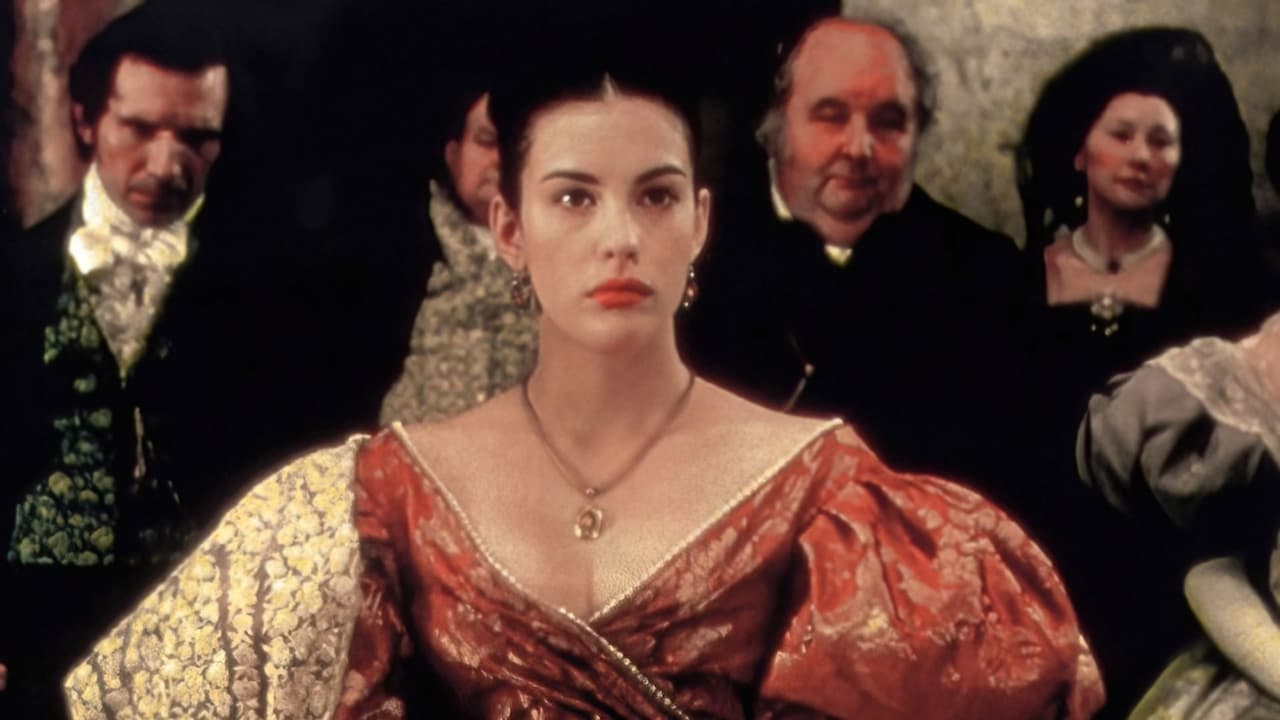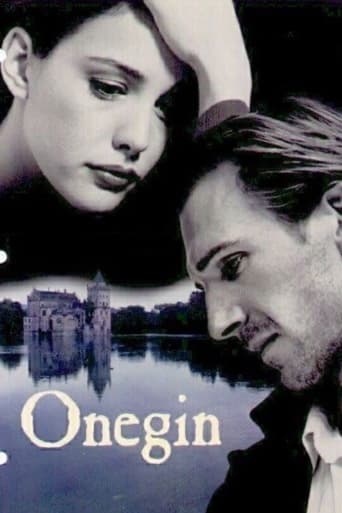

Bad Acting and worse Bad Screenplay
... View MoreAt first rather annoying in its heavy emphasis on reenactments, this movie ultimately proves fascinating, simply because the complicated, highly dramatic tale it tells still almost defies belief.
... View MoreThis is a must-see and one of the best documentaries - and films - of this year.
... View MoreThe best films of this genre always show a path and provide a takeaway for being a better person.
... View MoreDisclaimer for this review: the film is being judged on its own merits, not how accurately it adapts Pushkin's original novel-in-verse Eugene Onegin.Onegin takes place in Russia at some time between the Patriotic War of 1812 against Napoleon and the abolition of serfdom in 1861. It follows the titular Russian nobleman, who is called to the backwoods from his lavish life in St. Petersburg when he inherits his uncle's estate. The story centers upon his alienation from the privileges of nobility and weariness with the customs that accompany his class. Those fond of tales of historical high-society courtship such as the more recent Downton Abbey will find Onegin to be worthwhile viewing. In fact, despite the animosity between France and Russia after the War of 1812, the prevalence of French in dress, mannerisms, and language means that this film could, if not for the names of the characters, be easily assumed to take place within the aristocracy of Paris.While the original work Eugene Onegin was first published in 1833, 28 years before Tsar Alexander's emancipation of the serfs, Onegin muses upon the value of renting the land surrounding his estate and moving back to St. Petersburg rather than acting as its overseer. The idea is dismissed as absurd by his noble contemporaries, showcasing both Onegin's distaste for the traditions of his time and complete lack of concern for the opinion of his peers. This utter apathy is further revealed in Onegin's interactions with the neighboring noble family, particularly with the youngest daughter, Tatyana. Her older sister, Olga, is the fiancé of the poet Vladimir Lensky, and Onegin's disillusionment with the ideals expressed in Lensky's verse results in his alienation for all three. Even so, Tatyana confesses her adoration for the urbanite Onegin in a letter (addressed, as French was considered the language of sophistication in Russia at the time, to Monsieur Onegin). His answer to this admission comes only upon his reluctant acceptance of an invitation offered by Lensky. Onegin is told that it will be a small gathering for Tatyana's name day, but upon arrival finds that it is a full-scale ball, much like those that he had long ago grown tired of attending in St. Petersburg. As revenge against Lensky, Onegin dances with his fiancé Olga, resulting in her infatuation with the nobleman from St. Petersburg. Lensky is left furious as Onegin leaves the party to speak with Tatyana, coolly insisting that she abandon such childish notions as love before her innocence becomes her downfall. In return for Onegin's affront against him, Vladimir challenges him to a duel. Even when death is on the line, however, Onegin refuses to cooperate with the traditions of nobility, arriving to the duel late and appointing a servant as his second. Despite this, Lensky continues with the duel, resulting in his death. After this. while it is never shown on-screen, Onegin spends the next seven years traveling the world. When he returns, attending a ball much like those from before he departed for his uncle's estate, he finds that Tatyana has been married. Following the ball, he finds her at her home and insists that he was wrong to reject her. However, she rejects him much as he did after her confession, leaving the despondent Onegin to stand on the streets of St. Petersburg. As is fitting for a film based upon a poem, the visual imagery is striking. The cynical Onegin's meetings with idealist poet Vladimir Lensky more often than not take place on a dock by a lake. The stirring of the lake in the wind reflects the growing resentment between the two, culminating in their duel on that dock under an overcast sky. After meeting Tatyana for her name day celebration, she and Onegin retreat to a somewhat dilapidated shed away from the manor, the peeling paint a stark contrast to the lavish ball they have excused themselves from. With that departure from the rules imposed by an aristocratic setting comes Onegin's cuttingly forthright rejection of Tatyana. Upon Onegin's return to St. Petersburg, the lighting in the ball where he meets the married Tatyana reflects the ballet he attended at the introduction of the film, creating a literary framing effect. inclusion of a coffin in the frame as Onegin departs down the snowy, overcast street reflects the figurative death of Onegin's hopes and dreams.While not an exceptionally profound story, the characters of Onegin are handled well, as is essential for any drama, and offer an adequate glimpse into not only the social context of 19th century Russia but its philosophical quandaries of self-definition in the face of social constraints.
... View Moreactually a comedy.the original title was 'a day late and a dollar short', after a Hollywood bigwig was rummaging thru the studio archives and stumbled on an old 3 stooges script and decided the modern treatment would be to come up with another in a string of feinnes pieces passed off as a costume drama.the costumes were supposed to be clown costumes but since there was a glut of personnel and makeup artists doing stuff like 'sense and sensibility' it was decided to snazzy it up a bit.so they came up with this square peg in a round hole approach and once again, shopped around for who would fit the bill re 'when yer hot yer hot, when yer not yer not' and the names feinnes and liv deary came up.was this before or after those dreadful LOTR sequels of sequels where she hardly says anything? was this in her 'on the way up' or 'on the way down' phase of her film career? she was fairly good in 'inventing the abbots' but that's because she was at her peter principle level of highest competence. not so this vehicle. more like a vehicle hit by a train called reality of what you get with mediocre but much ballyhooed actors. aka 'hype hype hype' some sort of pep rally cry suitable for a high school football team. not suitable for a story that's been around this long.at least we don't have to hold our breath waiting for yet another version in this century; anyone else who may have contemplated it in another life was surely convinced the odds were not good since ms tyler and mr feinnes showed just how bad the pooch can be screwed by not getting suitable actors.you think I'm kidding about the day late and a dollar short theme? I counted at least 3 of them without trying: the dinner, the duel and the 'bitter sweet' (emphasis on bitter like the taste of stale beer) closing scene. I am so glad DVD player manufacturers perfected that feature you can speed up the playback and still hear the voice track at the original frequency, it just comes out in a rapid fire clipped manner. that cuts down the boredom until those blessed end credits envelope this symbol of the downfall of a frivolous life.I'm talking about the lead actors careers, not the characters in the story.
... View MoreMany viewers are quick to note the fine effort of the Fiennes family to bring a Russian literary masterpiece on screen in the English language. The Fiennes family need to be complimented for their dedicated work to bring such an important literary work closer to thousands who would never have heard the name of Yevgeny Onegin.However, I would like to underline the work of Martha Fiennes--the director. This is a marvelous debut for a director. The pivotal point of the film is the letter of Tatyana to Yevgeny. If the viewer were to replace the images of the blue/black ink with red blood, the images could have been of a lover hurting oneself while writing the letter. Pushkin intended this savage intensity--Ms. Fiennes succeeds in capturing this on screen without the blood. After the letter is written, the writer cleans her fingers on the white dress. The director's detailed shots on the writing of the letter, the opening of the letter, and the refusal of the return of the letter are visually as important as any performance in the film.Second, Martha Fiennes is to be complimented on the sartorial details of Tatyana. The gradual change in clothes--color-wise and wealth-wise--is structurally well done in tandem with the plot of Pushkin.I particularly loved the sequences of Onegin staring at neck of his lost love during the concert--Ms Feinnes captures the mood eloquently with shots which could easily have been spoiled had the camera been placed in front of the two actors.The opening shot of the sleigh drawn by horses is very Russian. Unfortunately, for Ms Feinnes, Russian director Igor Talankin's film "Tchaikovsky" had used similar imagery--only Talankin did it much better with striking effect.The duel sequence is perhaps an important part of the film, if one recalls the writer Pushkin himself went through such an ordeal in real life--I do not recall if "Yevgeny Onegin" was written before or after the incident...But Ms Feinnes' duel sequence is comparable to those of Kubrick in "Barry Lyndon" or Ridley Scott's brilliant early work "The Duellists." It is equally interesting to note that Pushkin's work alludes to the importance of married persons remaining faithful to each other--in real life Pushkin demanded the same of his wife, but suspected his spouse was cheating on him and this forced the duel that wounded him in real life.But what is the modern windmill doing in "Tsarist Russia"? The windmills in Tsarist Russia I believe had more spokes (or hands), if we were to go by the paintings of that era..Ms. Fiennes' on the other hand has taken care of details that a male director would have perhaps overlooked--the postures of Tatyana in the boat hidden by the reeds. Ms. Fiennes has shown talent in many ways that recall the brilliance of Julie Taymor. I only wish Fiennes were a Russian director using Russian actors--the work would then have been so real. For an effort from a non-Russian, I applaud her work as a director and the contribution of her family to the finished product. So is the contribution of cinematographer Remi Adeferasin. The performance of Liv Tyler should be assessed against the opportunity the role offered--she was good but not outstanding--she has done better under the direction of Robert Altman.
... View More"Onegin" tells of an enigmatic, inscrutable, and jaded aristocrat (R. Finnes) in 1800's St. Petersburg, Russia and his stuttering relationship with a beautiful woman (Tyler). With all the frills of a period costume flick this elegant but hollow and plaintive drama of unrequited love relies too much on its title character and too little on content and story. For most film fans, "Onegin" may just be a beautiful bore. However, for the serious film buff into unusual/peculiar dramas, this film may be a worthwhile watch with its depth of character, bleakly beautiful scenics, and usual storyline. This project received a lukewarm reception from the public and good critical reviews. In English with no CC's and Spanish subtitles only. (B)
... View More